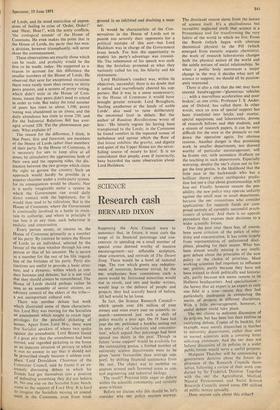SCIENCE
Research cash
BERNARD DIXON
Supposing the Arts Council were to announce that, in future, it must curb the range of its financial patronage and con- centrate its spending on a small number of special areas deemed worthy of massive encouragement—say inflatable sculpture, oboe concertos, and revivals of The Desert Song. There would be a howl of national rage. The row which greets any redeploy- ment of resources, however trivial, by the BBC emphasises how contentious such a move would be. Jettisoned minorities would rise in revolt, and MPS and leader writers, would leap to the defence of people and projects they had scarcely heard of before. All hell would be let loose.
In fact, the Science Research Council— which spends over £46 million of your money and mine every year on scientific re- search—announced just such a shift of policy exactly a year ago. On 19 June last year the SRC published a booklet setting out its new policy of 'selectivity and concentra- tion', which argued that patronage had been spread too thinly in the past. Though in future 'some support' would be available for the outstanding genius, a limited number of university science departments were to be given 'more favourable than average sup- port:, by shifting financial sustenance from the rest. The object was to mobilise re- sources around such favoured areas as con- trol engineering and industrial biology.
The result? Precious little anger or debate within the scientific community, and virtually none without.
Before we discuss why this should be, let's consider why SRC policy matters anyway.
The dominant reason stems from the nature of science itself. It's a platitudinous but incredibly neglected truth that science is a Promethean tool for transforming the very fabric of the world in which we live. From the Bomb (which began with abstruse theoretical physics) to the Pill (which emerged from esoteric organic chemistry), the work of research laboratories changes both the physical nature of the world and the subtle texture of social relationships. So when a public body announces a major change in the way it decides what sort of science to support, we should all be passion- ately interested.
There is also a risk that the SRC may have created bandwaggons—`glamorous vehicles . with a marvellous acceleration and poor brakes', as one critic, Professor J. S. Ander- son of Oxford, has called them. In other words, once an area of special support has been translated into bricks and mortar, special equipment and laboratories, droves of research fellows and PhD students, and a stream of research papers, it can be very difficult for the man at the pinnacle to run down the operation again, for obvious reasons. Another danger is that promising work in smaller departments, not deemed worthy of patticular encouragement, will be frozen out, with secondary ill-effects on the teaching in such departments. Especially worrying, despite the sac's claim not to for- get the lone genius, is the likelihood that the little man in the backwoods who has a brilliant theory about earthquake predic- tion but not a clue about grantsmanship, will lose out. Finally, however remote the pos- sibility, the new policy may operate unfairly against the small man or small department, because the SRC committees who consider applications for research funds are com- posed entirely of currently successful practi- tioners of science. And there is no appeals procedure that exposes their decisions to a wider scientific forum.
Over the past year there has, of course, been some criticism of the policy of selec- tivity and concentration. It has come largely from representatives of unfavoured disci- plines, pleading for their causes. What has been almost totally missing is any intelli- gent debate about the principles of the new policy or the choice of priorities. Most working scientists feel impotent to influence SRC politics, partly because they have not been trained to think politically and historic- ally, partly because SCR seems remote in its Holborn headquarters. And specialisation— the heresy that an expert is an expert in only one field at a time—means that they feel particularly inadequate in comparing the merits of projects in different disciplines. With a little encouragement, however, a useful debate could take place.
The sac claims to welcome discussion of its policies, but has been less than zealous in catalysing debate. Copies of its booklet, for example, were merely dispatched in batches to university departments, rather than sent to named scientists with a covering letter soliciting comments. And the SRC does not believe discussion of its policies in a wider public forum would serve a useful purpose. Margaret Thatcher will be announcing a government decision about the future de- ployment of the Research Councils them- Selves, following a review of their work con- ducted by Sir Frederick Dainton. Together with the. SRC the Agricultural, Medical, Natural Environment, and Social Science Research Councils spend some £90 million of public money annually.
Does anyone care about this either?


































 Previous page
Previous page